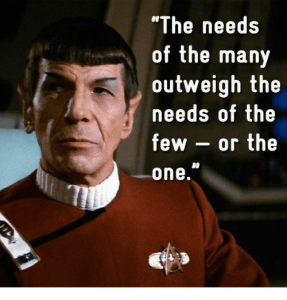I recently had the chance to watch Blade Runner 2049, the sequel to Ridley Scott’s 1982 science fiction masterpiece Blade Runner, which in turn was based on a short story by science fiction writer Phillip K. Dick. I’m a fan of the original movie, and I number myself among those who prefer the later versions (Director’s Cut, Final Cut). I liked, but didn’t love, the sequel, but that’s not today’s topic.
Rather, it’s the premise of corporate domination that Blade Runner and countless other science fiction tales invoke, almost invariably in a dystopian and cautionary form, that’s worth discussion.
Consumers of science fiction, whether it be print or visual, know of what I speak, and know it’s nothing new. Another SF favorite from 1975, Rollerball, depicted a handful of corporations running the world, each controlling a particular sector (e.g. Energy). This, again, was cautionary, where the hero, Jonathan E, threatened to disrupt the entire structure by demonstrating that an individual could make a difference.
That last point – individuals fighting entrenched oppressors, is another common trope of science fiction, and the oppressors aren’t limited to mega-corporations. Dictatorial or fascistic governments (Star Wars and Hunger Games, to name but two) are common bad guys.
On the flip side, there is science fiction where the governments work well, and people live in happiness, comfort, health, and harmony (e.g. Star Trek). Compared to the difficulties of modern life (relatively speaking – we’ve got it pretty damn good compared to everyone who lived before us), the idea that the future will bring relief from the things which trouble us most is very comforting and alluring. Thus, we’re inclined to accept whatever the writers present as part of their future vision.
Unfortunately, much of what they offer us is jarringly dissonant from the lessons of human history.
In the original Blade Runner, a number of corporations ascendant in 1982 were presented in blaring, neon dominance in 2019, when the story takes place. Among these are Atari, Koss, Pan Am, RCA, and Bell Telephone. All these are gone now, and it’s still two years until 2019. There’s been idle speculation of a “Blade Runner” curse, because not only have these companies faded away, survivors like Coca Cola and Cuisinart hit significant speed bumps shortly after the movie’s release. The reality, however, is far less curse and far more boring economic reality.
In 1955, Fortune published its first list of America’s 500 largest companies. Today, only 12% of those companies remain on Fortune’s list. The rest? Faded, subsumed, supplanted, thanks to the creative destruction of the marketplace. Corporations aren’t persistent, especially when they aren’t protected by government favoritism. Adapt or perish, as new ideas, better mousetraps, and other innovations come forth.
On the other hand, certain ideas about government are persistent, even when they’ve been attempted with catastrophic failure time and time again. Despite the blindingly obvious lesson of Venezuela’s swift and stunning collapse from one of the world’s richest and resource-blessed nations into utter ruin, thanks to socialism, and despite the multiple examples of mass death and human misery perpetrated by other socialist governments in the 20th century, socialist political thought is enjoying a resurgence in America.
We can blame our educational system, which fails to teach these blatant historical lessons, or the equally blatant historical evidence that capitalism and free markets, not collectivist government, are the means by which the human condition has improved over the centuries. We must also, however, point the finger at the pap served up by pop culture, including our most popular science fiction.
 Consider one of the most famous bits from the Star Trek oeuvre. Spock, both before and after a self-sacrifice that saved hundreds of lives, informed us that “the needs of the many outweigh the needs of the few, or the one.” And, indeed, such voluntary altruism carries a moral weight that’s hard to dispute.
Consider one of the most famous bits from the Star Trek oeuvre. Spock, both before and after a self-sacrifice that saved hundreds of lives, informed us that “the needs of the many outweigh the needs of the few, or the one.” And, indeed, such voluntary altruism carries a moral weight that’s hard to dispute.
Lets call that the Spock principle.
Consider, also, the mantra taught to a young Peter Parker by his soon-to-die Uncle Ben, as Peter was first figuring out his powers as Spider Man: “With great power comes great responsibility.” Again, there seems to be a moral weight behind these words that’s hard to dispute, even apart from comic book superhero powers.
Lets call that the Spiderman principle.
Now consider, the motorman of a passenger train or the pilot of an airplane have great power, and thus bear great responsibility. So does the trauma surgeon cutting open a patient in an operating room. Their responsibility is a negative one, however – they are obligated to do no harm in the course of their duties. This contrasts to a degree with Peter Parker’s “responsibility,” which is one of obligatory action. The motorman, the pilot, and the surgeon do their jobs, and in doing them act responsibly, but their responsibility ends when they go home. To think otherwise is to believe that the surgeon is obligated to work as much as he can, to forego the balance of his life in order to maximize the benefits his “power” offers to others.
That’s where the problem lies – in the idea of obligation to the collective. While Spock’s sacrifice was for the good of others, and it’s a sacrifice we see daily in war, in burning buildings, in working parents sacrificing for their children, these are voluntary and person-to-person sacrifices. While Spiderman’s obligation is a personal feeling that his gifts urge him to use them for the good of others, it remains his choice when, where and how to use them. The danger and bad lesson lies in translating the “needs of the many” philosophy into a justification for the political coercion of socialism. And, the danger of good-socialism science fiction is that it propagates a fantasy that runs contrary to massive, irrefutable evidence and to human nature itself.
Thus, we are taught to fear the wrong bogeymen. We are to worry about corporate domination of the world, when it’s quite clear that such fears are overwrought. We learn to downplay or ignore the dangers of socialist/collectivist thought by dismissing past and current failures in favor of fantasies crafted whole-cloth in some writer’s imagination. And, in doing so, we commit the common sin of American socialists: we extol the promises and ignore the costs. We imagine that free college and universal health care can be had without any new restrictions or added costs to us, ignoring that the nations who have such have rationing mechanisms and much higher taxes on their middle and working classes than we do.
We also think little of placing demands on others, using the Spock and Spiderman principles as cover. Indeed, the Spock principle sounds remarkably like Karl Marx’s slogan “From each according to his ability, to each according to his needs.” The crucial but subtle difference lies in voluntarism vs coercion, but it’s a difference most will ignore when it suits them to do so. Yet, for socialism to work, coercion is necessary. A six-foot-six, 275 lb strongman may want to pursue his dream of being an artist, despite little natural talent, and in a free society he could do so, and work odd jobs to feed himself as he strove against his mediocre gifts. However, were we to apply the Spock and Spiderman principles, he’d be obligated to work as a miner or a manual laborer of some sort, in order that society best benefit from his abilities.
 The Spock and Spiderman principles are alluring. They feel right, they appeal to our sense of morality, they speak of a higher level of thought. And, considered through a lens of voluntary action and individuality, they do offer moral lessons. Spock weighed the situation, and chose to sacrifice himself. Peter Parker felt he had a rare ability to help others, and chose to do so. Both did so on their own terms, though, not on terms decided for them by others. Thus, Jessica Jones’ reaction to the Spiderman principle. She followed that path for a while, it didn’t work out in a fairy tale ending, and left her suffering extreme emotional trauma. Would she still be obligated, despite all that, to use her super-strength for the common good? Or should she have a choice?
The Spock and Spiderman principles are alluring. They feel right, they appeal to our sense of morality, they speak of a higher level of thought. And, considered through a lens of voluntary action and individuality, they do offer moral lessons. Spock weighed the situation, and chose to sacrifice himself. Peter Parker felt he had a rare ability to help others, and chose to do so. Both did so on their own terms, though, not on terms decided for them by others. Thus, Jessica Jones’ reaction to the Spiderman principle. She followed that path for a while, it didn’t work out in a fairy tale ending, and left her suffering extreme emotional trauma. Would she still be obligated, despite all that, to use her super-strength for the common good? Or should she have a choice?
Pop culture plants ideas in the minds of even the most guarded and cynical, and today’s pop culture is remarkably consistent in perpetuating ideas that don’t stand to rational scrutiny. We can thank human nature for this, even as we lament that those ideas run contrary to human nature: people like imagining a world where they have greater ease and fewer problems, and those who falsely promise such via collectivist ideas are going to gain more attention than those who correctly assert that the path to such is through individual liberty and free enterprise.
It’s quite the shame, because it seems there’s a dearth of the types of stories I read as a teenager, the novels of my youth, the space-as-frontier tales by Robert Heinlein and Poul Anderson, where the heroes won out through self-determination and perseverance in tough conditions. Individualism, capitalism, and free market principles were presented as positives, as ideals to embrace. Government was minimal, and corporations were, well, not exactly benevolent, but not Evil personified either. They were what they are today – collections of people, working together and competing with each other, with the ironclad rules of the free market managing their interactions and behaviors.
It’s quite possible that the plethora of socialism-good-capitalism-bad science fiction (a cynic would call it fantasy, of course) is a petulant response to the ever-growing body of evidence that the opposite is true. Many socialism apologists retreat to a “it’s never been done properly” defense when Venezuela, the USSR, Red China, and other collectivist disasters are mentioned, and there’s little reason to believe that science fiction writers are immune from such tendencies. The obvious point to make, obviously, is that it is “fiction,” after all. No matter how clever or gifted the writer, successful socialism will forever remain that way.
Socialism in general has a record of failure so blatant that only an intellectual could ignore or evade it. — Thomas Sowell

“the types of stories I read as a teenager, the novels of my youth, the space-as-frontier tales by Robert Heinlein and Poul Anderson”
Two of my all-time favorite authors right there. My first science-fiction book I read at about the age of 14 was Andre Norton’s “Galactic Derelict” and I was hooked on SF.
Raised on RAH “juveniles” but I’ve pretty much abandoned SF which today is all about SJW virtue signaling. Some few exceptions.